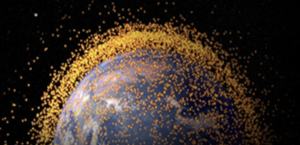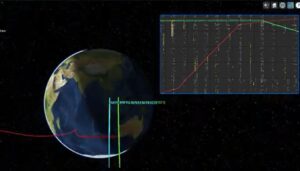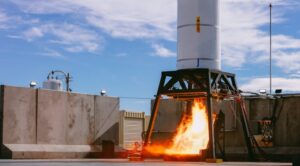Israel Signs Artemis Accords
Friday, 28 January 2022 07:26 In becoming the first country to sign the Artemis Accords in 2022, Israel affirmed its commitment to a common set of principles to guide cooperation among nations participating in 21st century space exploration.
"Israel already has demonstrated its commitment to Artemis with the contribution of the AstroRad radiation protection vest on Artemis I, scheduled to launch this spring," said NASA
In becoming the first country to sign the Artemis Accords in 2022, Israel affirmed its commitment to a common set of principles to guide cooperation among nations participating in 21st century space exploration.
"Israel already has demonstrated its commitment to Artemis with the contribution of the AstroRad radiation protection vest on Artemis I, scheduled to launch this spring," said NASA Scientists make a new type of optical device using alumina
Friday, 28 January 2022 07:26 Scientists from the Kavli Institute for the Physics and Mathematics of the Universe and the University of Minnesota, Tomotake Matsumura and Shaul Hanany, and their collaborators have made a new type of optical element that will improve the performance of telescopes studying radiation from the Big Bang.
The cosmic microwave background (CMB) is a relic radiation remnant from the big bang. It
Scientists from the Kavli Institute for the Physics and Mathematics of the Universe and the University of Minnesota, Tomotake Matsumura and Shaul Hanany, and their collaborators have made a new type of optical element that will improve the performance of telescopes studying radiation from the Big Bang.
The cosmic microwave background (CMB) is a relic radiation remnant from the big bang. It Understanding how efficient solar flares release their energy
Friday, 28 January 2022 07:26 New findings published Jan. 27 in the journal Nature Astronomy have called into question decades of theoretical understanding used by astrophysicists to interpret an observational phenomenon central to understanding energy released during powerful eruptions from the Sun, known as solar flares.
Solar flares, which are triggered when magnetic field lines break and reconnect above the Sun's s
New findings published Jan. 27 in the journal Nature Astronomy have called into question decades of theoretical understanding used by astrophysicists to interpret an observational phenomenon central to understanding energy released during powerful eruptions from the Sun, known as solar flares.
Solar flares, which are triggered when magnetic field lines break and reconnect above the Sun's s CU Boulder scientists bring stellar flares into clearer focus
Friday, 28 January 2022 07:26 Armed with a new statistical analysis of stellar flares on hundreds of distant stars, scientists are beginning to understand the likelihood that remote "exoplanets" might sustain life in our galaxy, research at the University of Colorado Boulder suggests.
The most-intense flares, which are more complex than previously observed, could have implications for the viability of life on nearby pl
Armed with a new statistical analysis of stellar flares on hundreds of distant stars, scientists are beginning to understand the likelihood that remote "exoplanets" might sustain life in our galaxy, research at the University of Colorado Boulder suggests.
The most-intense flares, which are more complex than previously observed, could have implications for the viability of life on nearby pl Hat-trick for Exolaunch with SpaceX Transporter Missions
Friday, 28 January 2022 07:26 In its third dedicated rideshare mission with SpaceX, Exolaunch, the leading global provider of launch, in-space logistics and deployment services, successfully integrated and launched 29 small satellites from customers across the globe. The company's rideshare clusters aboard the SpaceX Transporter-3 mission were an amalgamation of microsats, cubesats (up to 16U) and PocketQubes. The combinatio
In its third dedicated rideshare mission with SpaceX, Exolaunch, the leading global provider of launch, in-space logistics and deployment services, successfully integrated and launched 29 small satellites from customers across the globe. The company's rideshare clusters aboard the SpaceX Transporter-3 mission were an amalgamation of microsats, cubesats (up to 16U) and PocketQubes. The combinatio NASA aims to make observations from space junk collision with Moon
Friday, 28 January 2022 07:26 NASA said Thursday it aims to survey the crater formed when the remains of a SpaceX rocket are expected to crash into the Moon in early March, calling the event "an exciting research opportunity."
The rocket was deployed in 2015 to put a NASA satellite into orbit and its second stage, or booster, has been floating in the cosmos ever since, a common fate for such pieces of space technology.
NASA said Thursday it aims to survey the crater formed when the remains of a SpaceX rocket are expected to crash into the Moon in early March, calling the event "an exciting research opportunity."
The rocket was deployed in 2015 to put a NASA satellite into orbit and its second stage, or booster, has been floating in the cosmos ever since, a common fate for such pieces of space technology. Space Power to revolutionize satellite power using laser beaming
Friday, 28 January 2022 07:26 The University of Surrey and Space Power are tackling the problem of powering satellites in Low Earth Orbit (LEO) during their eclipse period when they cannot see the sun. By collaborating on a space infrastructure project, the joint team will develop new technology which uses lasers to beam solar power from satellites under solar illumination to small satellites orbiting closer to Earth during
The University of Surrey and Space Power are tackling the problem of powering satellites in Low Earth Orbit (LEO) during their eclipse period when they cannot see the sun. By collaborating on a space infrastructure project, the joint team will develop new technology which uses lasers to beam solar power from satellites under solar illumination to small satellites orbiting closer to Earth during What wintering squirrels can teach astronauts
Friday, 28 January 2022 07:26 When bears and ground squirrels hibernate in winter, they stop eating, lasting until spring simply on the fat reserves they've stored up in their bodies. Usually, this sort of prolonged fasting and inactivity would significantly reduce the mass and function of muscle, but hibernators don't suffer this fate. How they avoid it, however, has been a mystery.
Now, in research published in Scien
When bears and ground squirrels hibernate in winter, they stop eating, lasting until spring simply on the fat reserves they've stored up in their bodies. Usually, this sort of prolonged fasting and inactivity would significantly reduce the mass and function of muscle, but hibernators don't suffer this fate. How they avoid it, however, has been a mystery.
Now, in research published in Scien China to explore more in space science next five years: White paper
Friday, 28 January 2022 07:26 China will carry out more space science exploration in the next five years, according to a white paper on the country's space activities released Friday.
The white paper, titled "China's Space Program: A 2021 Perspective," was released by the State Council Information Office.
It says that China will continue with the research and development of programs such as the satellite for spac
China will carry out more space science exploration in the next five years, according to a white paper on the country's space activities released Friday.
The white paper, titled "China's Space Program: A 2021 Perspective," was released by the State Council Information Office.
It says that China will continue with the research and development of programs such as the satellite for spac China welcomes intl cooperation in space station, explorations: White paper
Friday, 28 January 2022 07:26 China will employ its space station for carrying out astronomical observations, Earth science and research, and space science experiments in the next five years, according to a white paper published Friday.
The white paper, titled "China's Space Program: A 2021 Perspective", was released by China's State Council Information Office.
The country plans to complete the construction of it
China will employ its space station for carrying out astronomical observations, Earth science and research, and space science experiments in the next five years, according to a white paper published Friday.
The white paper, titled "China's Space Program: A 2021 Perspective", was released by China's State Council Information Office.
The country plans to complete the construction of it Space Force’s troubled space-tracking system is officially shut down
Thursday, 27 January 2022 23:46
The Space Force announced Jan. 26 it has closed down the last remaining piece of the troubled Joint Mission System (JMS).
The post Space Force’s troubled space-tracking system is officially shut down appeared first on SpaceNews.
DoD weapons testers to assess cybersecurity of GPS satellites, ground system and user equipment
Thursday, 27 January 2022 22:34
DoD's office of operational test and evaluation will assess "the survivability of the entire GPS enterprise in a contested space environment"
The post DoD weapons testers to assess cybersecurity of GPS satellites, ground system and user equipment appeared first on SpaceNews.
China’s Shijian-21 spacecraft towed a dead satellite high above graveyard orbit
Thursday, 27 January 2022 19:00
China’s Shijian-21 space debris mitigation satellite has docked with a defunct Chinese satellite to drastically alter its geostationary orbit, demonstrating capabilities only previously exhibited by the United States.
China’s Shijian-21 towed dead satellite to a high graveyard orbit
Thursday, 27 January 2022 19:00
China’s Shijian-21 space debris mitigation satellite has docked with a defunct Chinese satellite to drastically alter its geostationary orbit, demonstrating capabilities only previously exhibited by the United States.
ABL Space Systems test accident to delay first launch by three months
Thursday, 27 January 2022 18:59
ABL Space Systems says a test incident that destroyed the upper stage of its RS1 rocket last week will delay that vehicle’s first flight by three months as it identifies and corrects the failure’s root cause.
